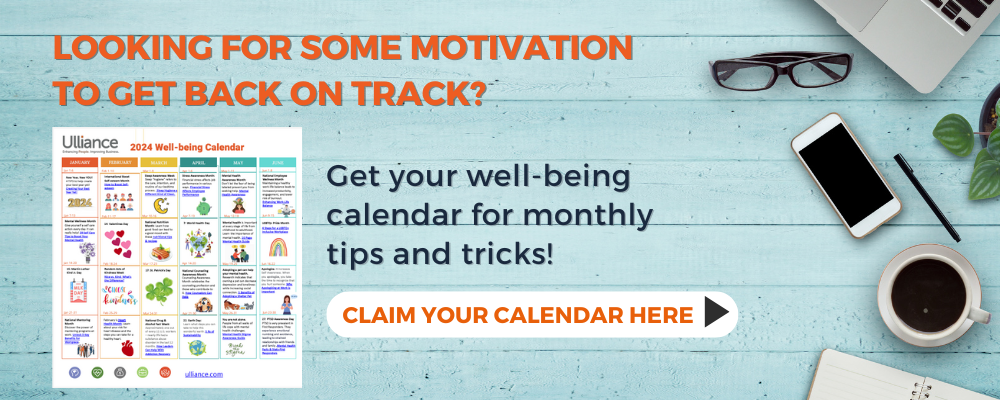Taking a vacation is essential for maintaining both physical and mental well-being. Stepping away from the daily grind allows your mind to recharge, sparking new ideas and creative inspiration that can benefit your work.
Employee time off can be beneficial for employers as well. The National Council for Mental Wellbeing cites these benefits:
● Higher productivity
● Reduced absenteeism
● Improved employees' mental health
● Help with employee acquisition and retention
● Improved company culture
However, returning to work after a long vacation can be a daunting experience. The carefree days of relaxation and rejuvenation are suddenly replaced by the familiar hustle and bustle of the office. It's no wonder many professionals struggle to regain their momentum and focus in the days and weeks following an extended break.
Tips for Getting Back to Your Work Routine
The key to returning from a long vacation is to ease back into your routine gradually, rather than trying to dive in headfirst. Here are some strategies to help you make the transition back to work seamless and productive.
Tip #1: Plan Ahead
Returning to work after a vacation doesn't have to be a stressful scramble. By taking time to plan ahead, you can set yourself up for a smooth and productive return. Start preparing for your comeback before your vacation ends, so you're not left feeling overwhelmed on your first day back.
- Review your calendar. Take a close look at your schedule and identify any important deadlines, meetings, or projects that need to be addressed right away. Prioritize these tasks so you can tackle them first.
- Communicate with your team. Reach out to your manager and key colleagues to let them know when you'll be returning. Provide an update on any outstanding items and set expectations for your first week back.
- Tidy up your workspace. Spend time organizing your desk, clearing out any clutter, and ensuring you have easy access to the files and tools you'll need. A clean, organized space can help you feel more focused and in control.
- Batch your emails. If you know you'll be returning to a full inbox, set aside time each day to methodically work through your messages. Prioritize those that require attention soonest and avoid the temptation to dive in all at once, which can quickly become overwhelming.
Tip #2: EAse InTO IT
Don't try to dive back in headfirst on your first day back. Instead, ease into your routine gradually over the course of the first week. This will help you avoid feeling overwhelmed and burnt out.
- Start slowly. On your first day back, focus on getting reacquainted with your workspace and catching up on any urgent tasks. Avoid scheduling too many meetings or taking on new projects right away.
- Gradually increase your workload. Over the next few days, slowly start to take on more responsibilities and tasks. But be mindful of not overcommitting yourself.
- Schedule regular breaks. Make sure to take breaks throughout the day to recharge and avoid burnout. Even a quick 10–15-minute walk or meditation session can make a significant difference.
- Don't overcommit. Be selective about the meetings and projects you agree to in your first week back. It's better to under-promise and over-deliver than the other way around.
Easing back into your routine will help you regain your focus and productivity without feeling overwhelmed.

Tip #3: Tackle the easy stuff first
When you return to work, it can be tempting to dive right into the most complex or time-consuming tasks on your plate. But some experts suggest that this approach can be counterproductive. Instead, they recommend starting by tackling the simpler, more straightforward items on your to-do list.
- Begin with quick wins. Identify the easiest tasks you can quickly check off your list. This will help you build momentum and confidence as you get back into the swing of things.
- Save the big projects for later. Leave the more complex, time-consuming projects for later in the week when you've had more time to re-acclimate.
- Celebrate small accomplishments. As you check items off your list, take a moment to acknowledge your progress. This can help boost your morale and motivation.
Knocking out the easy stuff first will give you a sense of progress and control, making it easier to tackle the bigger challenges later on.
Tip #4: Manage Expectations
It's important to have an open and honest conversation with your manager about your return to work. Set realistic goals and timelines for catching up on any outstanding tasks or projects.
- Communicate challenges. Be upfront about any limitations or challenges you're facing as you transition back, such as feeling fatigued or needing to ramp up on certain projects.
- Establish reasonable deadlines. Collaborate with your manager to set achievable deadlines for getting back up to speed. Avoid committing to unrealistic timelines that will only add to your stress.
- Prioritize tasks collaboratively. Discuss which tasks should be your top priorities and which can wait until you've had more time to settle in.
Managing expectations with your manager will help ensure a smooth and productive return to work.
Tip #5: Prioritize self-care
During the transition back to work, it's crucial that you prioritize your own well-being. Make sure to get enough sleep, eat well, and exercise regularly to keep your energy levels up.
- Maintain a healthy routine. Try to stick to your normal sleep schedule, mealtimes, and exercise regimen as much as possible. Consistency can help you feel grounded.
- Take regular breaks. Throughout the day, step away from your desk for short breaks to recharge. Even a quick walk or meditation session can make a big difference.
- Practice stress management. Incorporate stress-relieving activities like deep breathing, journaling, or listening to calming music. This can help you stay centered and focused.
Caring for your physical and mental health will enable you to be more productive and engaged when you're on the clock.
Tip #6: Minimize Distractions
It's easy to get pulled into the endless scroll of social media or the temptation to browse the internet when you're feeling overwhelmed. But these distractions can quickly derail your productivity.
- Turn off notifications. Silence or disable notifications on your devices to avoid constant interruptions throughout the day.
- Close unnecessary tabs. Keep your computer desktop and browser free of clutter by closing any tabs or windows you don't immediately need.
- Create a dedicated workspace. Set up your desk or work area in a way that minimizes visual and auditory distractions.
Reducing these common productivity pitfalls will help you stay focused and on-task as you transition back into your routine.
Tip #7: Schedule a Transition day
If possible, see if you can request a "transition day" before fully returning to work. Use this time to catch up on emails, review your calendar, and prepare for the week ahead.
- Catch up on emails. Spend time methodically working through your inbox so you can start the week with a clean slate.
- Review your calendar. Familiarize yourself with any upcoming meetings, deadlines, or other important events on your schedule.
- Plan your week. Identify your top priorities and map out a rough plan for how you'll tackle them over the next few days.
This transition day can help you feel more organized, focused, and in control when you officially return to your regular work duties.
Tip #8: reconnect with colleagues
After being away for an extended period, it's important to re-establish connections with your team members and key stakeholders.
- Schedule catch up meetings. Reach out to your colleagues and set up brief one-on-one meetings to get caught up on any changes or new projects.
- Attend team meetings. Make an effort to attend any group meetings or check-ins, even if you don't have an active role. This will help you stay in the loop.
- Celebrate successes. Congratulate your teammates on any accomplishments or milestones they achieved during your absence. This can help you rebuild rapport.
Rebuilding those professional relationships will make it easier to get back up to speed and collaborate effectively.
Tip #9: celebrate small wins
As you work to regain your momentum, it's important to acknowledge and celebrate your progress, no matter how small. This can help boost your morale and motivation.
- Reward yourself. After completing a task or reaching a milestone, take a moment to do something enjoyable, whether it's treating yourself to a snack, going for a walk, or listening to your favorite music.
- Share successes. Let your manager and teammates know about the progress you're making. This can help you stay accountable and recognized for your efforts.
- Practice gratitude. Take time each day to reflect on what you've accomplished, even if it's just getting through your to-do list. Expressing gratitude can improve your overall mindset.
Celebrating your wins, no matter how small, will help you stay positive and energized as you transition back into your work routine.
Returning to work after a long vacation can be a challenging experience, but with the right strategies and mindset, you can make the transition seamless and productive. Acknowledge that it may take some time to fully re-acclimate, and don't be afraid to ask for support from your manager or colleagues.
When you partner with Ulliance, our Life Advisor Consultants are always just a phone call away to teach ways to enhance your work/life balance and increase your happiness. The Ulliance Life Advisor Employee Assistance Program can help employees and employers come closer to a state of total well-being.
Investing in the right EAP or Wellness Program to support your employees will help them and help you. Visit https://ulliance.com/ or call 866-648-8326.
The Ulliance Employee Assistance Program can address the
following issues:
• Stress about work or job performance
• Crisis in the workplace
• Conflict resolution at work or in one’s personal life
• Marital or relationship problems
• Child or elder care concerns
• Financial worries
• Mental health problems
• Alcohol/substance abuse
• Grief
• Interpersonal conflicts
• AND MORE!
Have some questions about our services? Book a quick meeting below!
References:
3 Strategies to Avoid the Post-Vacation Return to Work Anxiety; Fast Company; Carson Tate, https://www.fastcompany.com/90651204/3-strategies-to-avoid-the-post-vacation-return-to-work-anxiety
5 Ways Employee Vacations Have Bottom-line Benefits; National Council for Mental WellBeing
https://www.mentalhealthfirstaid.org/2022/08/5-ways-employee-vacations-have-bottom-line-benefits/
Back From a Long Vacation? Nine Tips for Getting Back into Your Work Routine; Forbes; Council Post
https://www.forbes.com/sites/theyec/2022/09/09/back-from-a-long-vacation-nine-tips-for-getting-back-into-your-work-routine/?sh=582362946bc2
How Taking a Vacation Improves Your Well-Being; Harvard Business Review; Rebecca Zucker, https://hbr.org/2023/07/how-taking-a-vacation-improves-your-well-being

